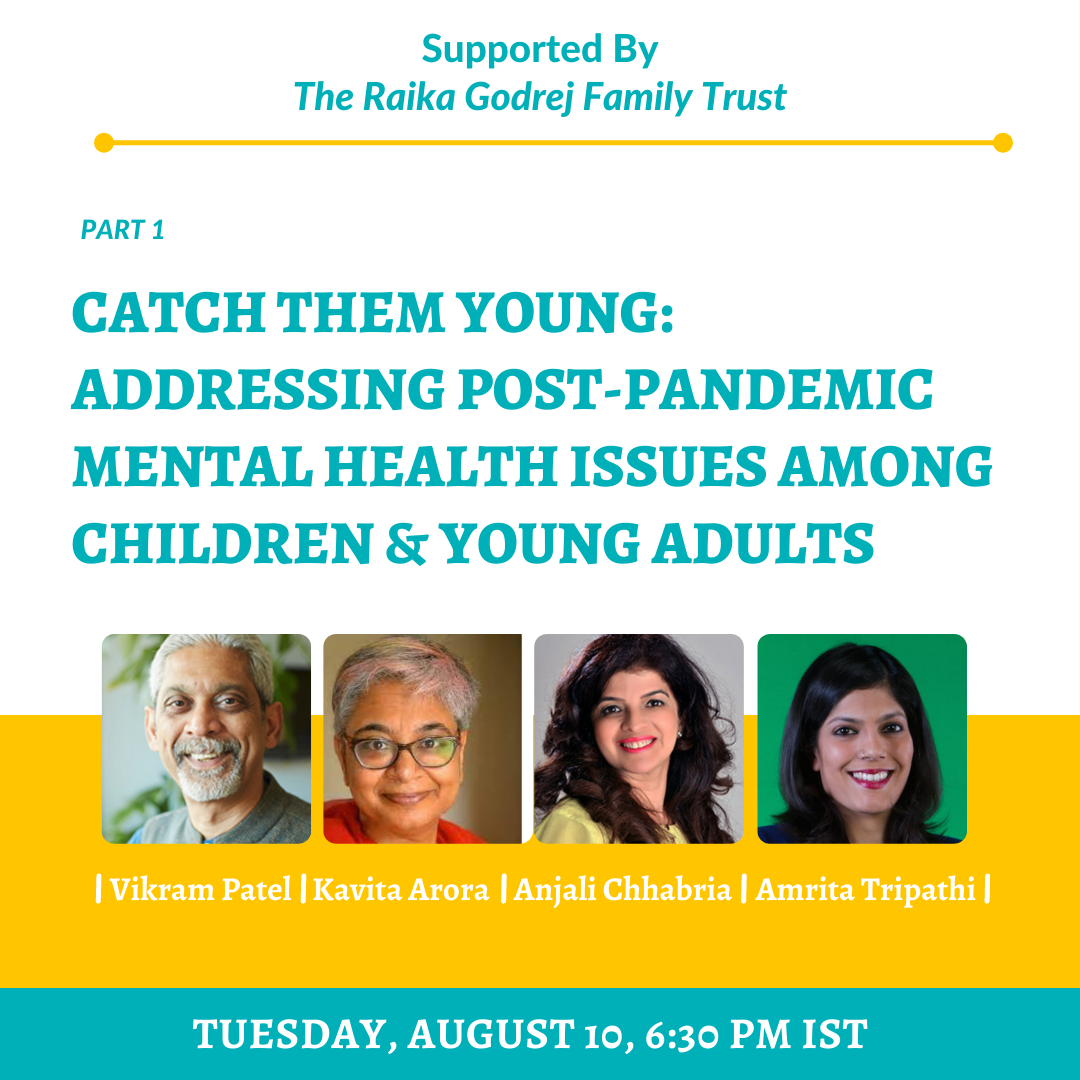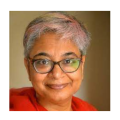Catch Them Young : Addressing Post-Pandemic Mental Health Issues Among Children & Young Adults
VIEW EVENT DETAILS
LIVE ON FACEBOOK
Register on Zoom!
A rise in stress and mental trauma are areas where children and young adults have witnessed a fundamental behavioural shift since the pandemic and lockdown. Confined indoors, children are having closer encounters with social-emotional stress and grief. Many of the 1.3 lakh children and young adults in India, who have lost their primary or secondary caregivers to coronavirus, find themselves without any adequate emotional support. Additionally, for over a year now, children and young adults have been exposed to a solely digital pedagogy. A steep rise in e-learning platforms, since the onset of the COVID-19 pandemic, has not only changed learning globally but also altered the way in which students communicate with their peers and with their immediate familial environment. For a lot of them, the pandemic has taken away opportunities to experience important milestones in their lives, like graduation, first day of college, farewells etc. Psycho-social learning, an important aspect of a child’s education, has, unfortunately, been a major void in the absence of in-person school.
Experts believe that social isolation amongst children, over exposure to social media and lack of peer support can pose serious mental-health challenges. These challenges are steeper among children from vulnerable social groups and low-income families, especially those with difficult domestic and parental situations. If left unaddressed, these factors can lead to severe cases of anxiety, depression and even drug abuse among young adults. Furthermore, as India readies itself for a potential third-wave of transmission, children in the age group of 15-18 are yet to be inoculated, posing additional health risks to this group.
A recent report by The Lancet titled 'COVID-19 and adolescent mental health in India' shares some important notes on how India can build an early detection framework for risks of mental disorders amongst this age group. The report states, "Teachers and parents can be trained to identify signs and symptoms that suggest poor mental health, such as sleep disturbances, excessive anger, and difficulty concentrating." Mental health practitioners also suggest developing an evidence-based elaborative action plan that can support the emotional and psychological needs of the youth during these times of crisis. Sensing the urgency of this crisis, the Government of India has initiated a series of programmes, including the mental health rehabilitation helpline, KIRAN, aimed at early detection and diagnosis of mental health disorders amongst young adults.
Given the crisis at hand, can mental-health issues rising due to overexposure to technology be limited with a blended pedagogical approach? What support systems and help-line frameworks should be institutionalised for early detection and wider coverage of mental health diagnosis? How can parents and family members be better trained to support children and young adults during these times? Are schools and educational institutions in India well-equipped to address mental health needs of their students once they return to in-person learning? Do social media platforms invest in disseminating awareness about mental health and existing support mechanisms?
Join us for a conversation aimed at understanding the impact of COVID-19 on mental health of children and adolescents and how these rising psycho-socio risks can be addressed with Prof. Vikram Patel, Dr. Anjali Chhabria, Dr. Kavita Arora and Amrita Tripathi.
------------------------------------------------------------------
This is the first programme of our three-part series on 'The Invisible Pandemic: Mapping Post-COVID-19 Mental Health Crisis in India'. This series is supported by the 'The Raika Godrej Family Trust'.

Vikram Patel is The Pershing Square Professor of Global Health in the Blavatnik Institute's Department of Global Health and Social Medicine at Harvard Medical School. He co-leads the Department’s Mental Health for All lab and co-leads the Global Mental Health Harvard initiative. His work has focused on the burden of mental health problems across the life course, their association with social disadvantage, and the use of community resources for their prevention and treatment.

Kavita Arora is a co-founder of Children First and loves to connect with children and young people. She is of the firm belief that youngsters today are far smarter and quicker to learn and evolve than previous generations! She is curious about new perspectives, and prefers a question to an answer. She happens to be qualified as a psychiatrist, but would prefer to be a DIY guru.

Dr Anjali Chhabria, is a leading psychiatrist and psychotherapist based in India. She has graced panels on various television shows like Satyamev Jayate and has spoken at Tedx Christ University and Tedx Youth SIS Mumbai. Dr Chabbria is the author of the book “Death Is Not the Answer,” which breaks the taboo on discussing the sensitive subject of suicide and provides the readers with ways to prevent it.

Amrita Tripathi is a freelance journalist and a novelist. She was a member of the launch team at CNN-IBN (India) and worked at the news channel as a Senior News Anchor, Health & Books Editor, Special Correspondent (New York) and Special Correspondent (Foreign Affairs) over a nine-year stint. Her passion project is The Health Collective, and encouraging conversations on mental health.
Outreach Partner

